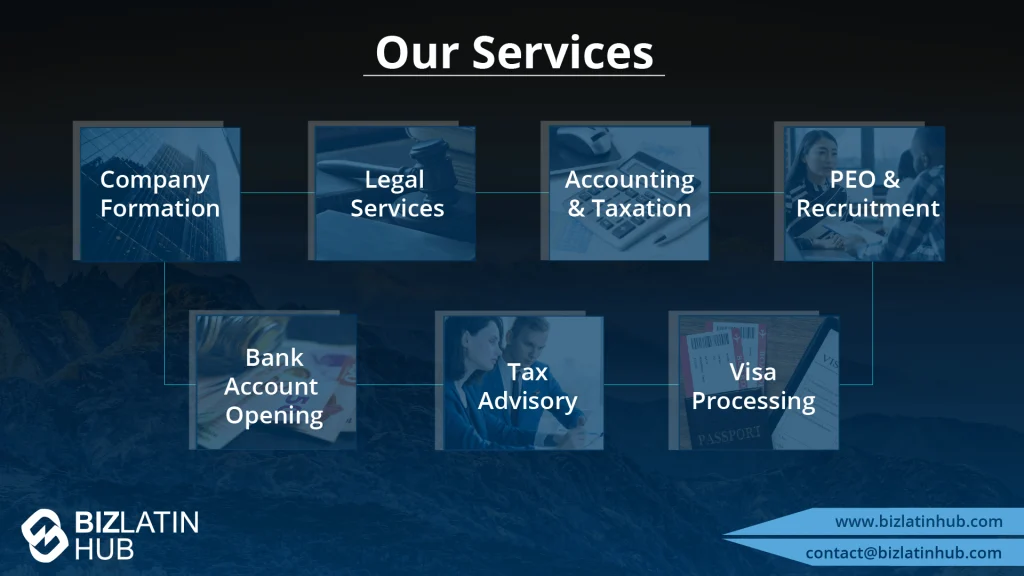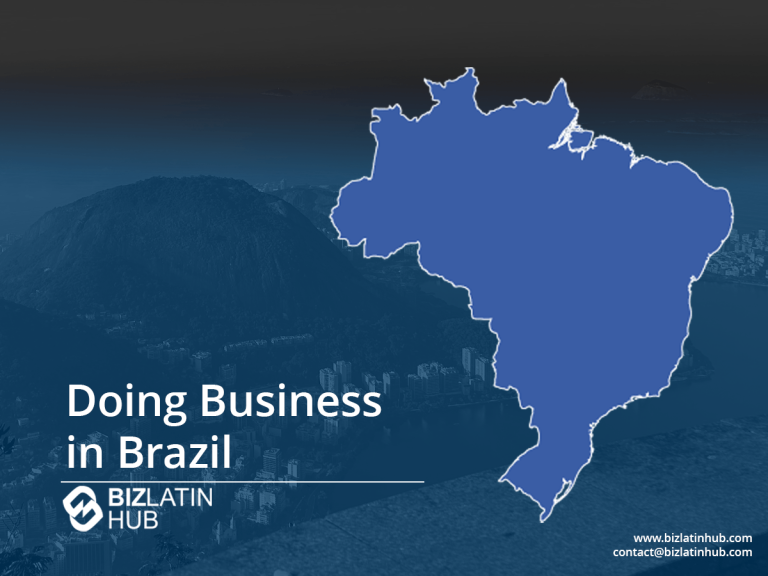Considered the eighth largest economy in the world and the largest in Latin America, Brazil is a leading economic figure in the region. The country recently saw its GDP (PPP) reach US$4.25 trillion. There is a growing middle class in terms of internal market, with similar opportunities to export from Brazil as well.
Brazil’s strategic location, diversified economy and domestic market of over 200 million people make it a hotspot for foreign business and investment. Companies using Brazil as their springboard into the wider regional market are looking at exportable goods and penetrable markets nearby. If you want to export from Brazil, it’s important to understand local regulations to move your goods and services across borders in this thriving continent.
At Biz Latin Hub, we can help you export from Brazil. That might mean working with PEO services, establishing a branch office, or even full LLC formation in Brazil if that’s the direction you wish to go in. Our array of back office services can help you within the country or with exporting within the region, as we have 18 dedicated offices across Latin America and the Caribbean.
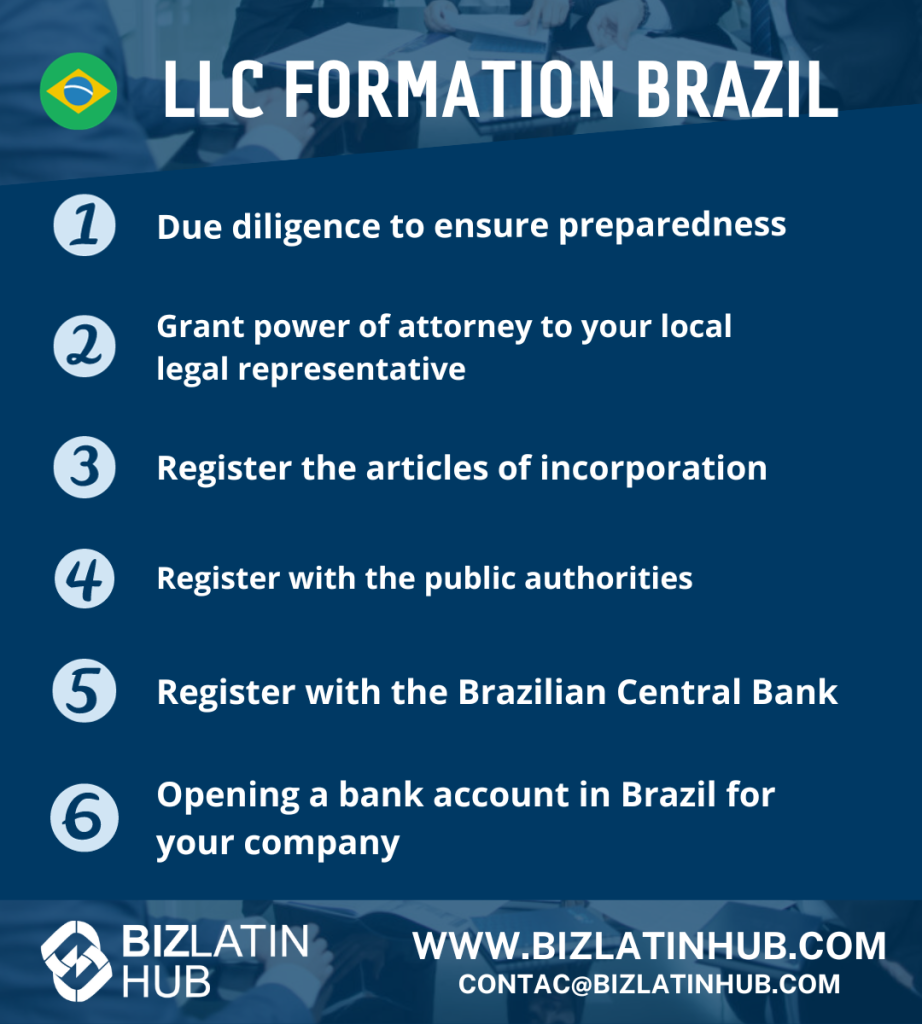
Export from Brazil – Foreign investment activity
The country counts on its high-performing industries that attract this investment, such as
- oil and gas extraction
- the automotive industry
- financial services
- trade
- electricity
- paper production
- information and communication technologies
- storage and transport
- food industry and mining.
To further develop its economy, the government has made attracting greater levels of foreign investment the central objective of its international policy for the last decade. To this end, Brazil is taking action to improve, strengthen, and implement laws and regulatory procedures, in order to provide investors with a favorable business environment in the country.
The Brazilian export market
Brazil’s export market is critical to its economy and has been growing actively in recent years. During the first 7 months of 2019, the country exported about US$130 billion worth of goods, with Asia as its leading destination (44%).
Brazil exports a different variety of products, but top exported goods include:
- Oilseeds (14% of total exports)
- Mineral fuels, including petroleum (12.4%)
- Ores, slag, ash (9.9%)
- Machinery, including computers (6.2%)
- Meat (5.5%)
- Vehicles (5.3%).
Some of these goods have grown exponentially in export volume, notably:
- mineral fuels, including oil, with the growth of 39.8% in 2017, and
- food industry waste, with an increase of 32.9%.
It is essential that as an exporter, you pay close attention to laws governing export procedures in Brazil.
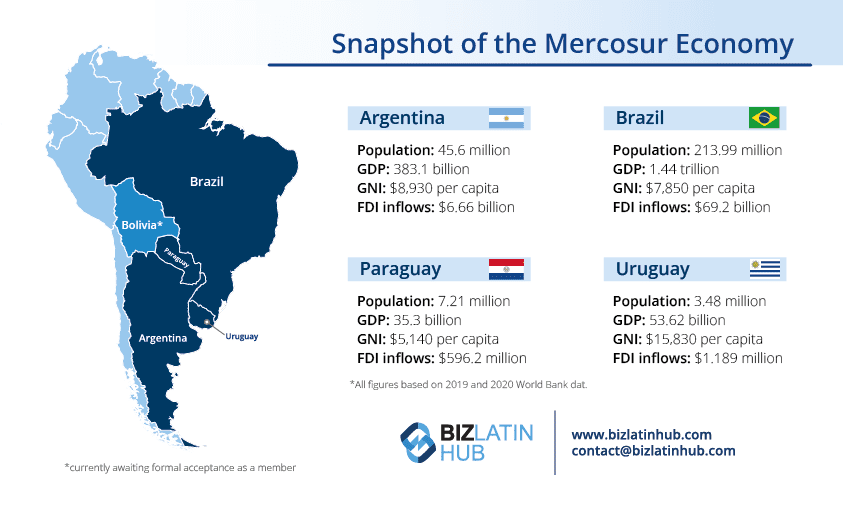
Exporting successfully from Brazil
Exporting requires particular attention to the administrative process and the documents requested by local authorities. In the event of missing information or an error in your file, you can lose valuable time and resources. Knowing what to expect and what documents you need to provide will enable your business to get started quickly, efficiently, and without undue delay.
1. Pay attention to the tariff classification
Firstly, you must check at which price category your product is sold. This will help you to apply the right tax rate (VAT) and thus be able to anticipate your moves and export costs correctly.
There are several ways to find out which tariff category your products belong to. The categories vary depending on your chosen export destinations.
For example, if you wish to trade with MERCOSUR member countries, you must refer to the Mercosur Common Nomenclature (MCN).
2. Get your certificate of origin
The certificate of origin is a document provided by the Chamber of Commerce that proves the source of your goods. You’ll need to send document to the importer as well, to guarantee its origin, but this also enables you to apply the right customs regime. It can be requisitioned at customs, so to avoid inconvenience but above all is a good thing to have when negotiating with the importer.
3. Obtain and organize your administrative documents
As in most countries, Brazil has a control and standardization body overseeing manufacturing and quality processes. It is the exporter’s responsibility to specify the characteristics of the goods, and how they’re made, so that local customs officers can check whether they correspond to the standards of their country.
It is therefore imperative that the exporter fills out the right documents in the correct order. In the event of a breach, the customs services are entitled to impose high fines or even to seize your goods. To avoid paperwork problems or setbacks, it’s advisable to get help from a competent local customs broker. Their knowledge of export laws and administrative procedures will save you time and avoid any unpleasant surprises.
Depending on the type of product, more specific procedures and documents are required. In Brazil, the essential ones are:
- Obtain your export permit by registering in the Exporter and Importer Register (EIR) – SECEX/MDIC
- Prepare requested export contract documents
- Confirm the importer’s request with the letter of credit that confirms the demand for goods
- The requirement to register your company for RADAR and Siscomex services in Brazil lasts from 10-17 days
- For your products, if you want to register them correctly, you need Sistema Integrado de Comércio Exterior (Siscomex). A computerized system, responsible for integrating information on foreign trade operations such as registration, monitoring, control, and others
- To register your company as an exporter, you must follow the process established by the Registo de Qualificação no Registo Aduaneiro de Interveniente Interveniente Provisório e Ambiente de Rastreio (RADAR)
- To do so, you must register with the Foreign Trade Secretariat (SECEX). You will need to obtain your registration number in the National Persons Register (CPF) or the National Tax Register (CCG) for the customs clearance of goods
- Complete an export registration form
4. Mastering Incoterms
As the very foundation of international trade, the knowledge and mastery of Incoterms are essential for anyone wishing to export products.
Incoterms (a contraction of International Commercial Terms) are standardized terms used to define the rights and duties of buyers and sellers involved in international and domestic trade.
Incoterms are developed and regulated by the International Chamber of Commerce (ICC). With 3 distinct letters, the ICC uses incoterms to define the responsibilities and obligations of the exporter and importer. It takes into account, in particular, loading and transport information, type of transportation used, insurance, risks, and place of delivery.
An example of one widely used Incoterm is ‘Free On Board’ (FOB). This term relieves the exporter of certain responsibilities once the goods are loaded on a carrier vessel. They then become the responsibility of the importer. FOB responsibilities that transfer from the exporter to the vessel’s operators can include freight rental and international freight insurance.
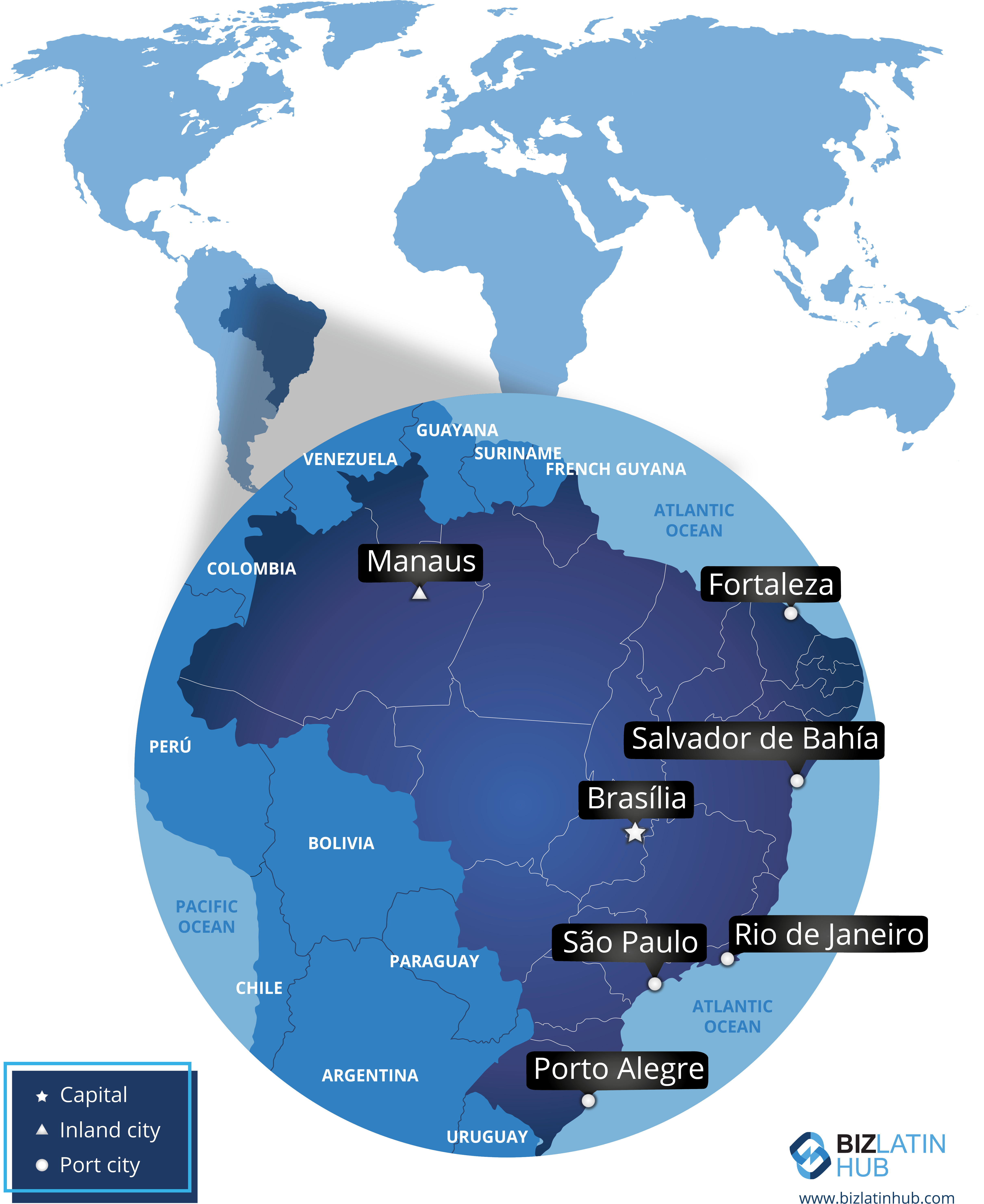
FAQs on how to export from Brazil
Yes, Brazilian companies can be 100% foreign-owned.
To register your company as an exporter, you must follow the process established by the Registo de Qualificação no Registo Aduaneiro de Interveniente Interveniente Provisório e Ambiente de Rastreio (RADAR)
To do so, you must register with the Foreign Trade Secretariat (SECEX). You will need to obtain your registration number in the National Persons Register (CPF) or the National Tax Register (CCG) for the customs clearance of goods.
Incoterms are developed and regulated by the International Chamber of Commerce (ICC). With 3 distinct letters, the ICC uses incoterms to define the responsibilities and obligations of the exporter and importer. It takes into account, in particular, loading and transport information, type of transportation used, insurance, risks, and place of delivery.
There are many, but key areas are:
Oil and gas extraction
The automotive industry
Financial services
Trade
Electricity
Paper production
Information and communication technologies
Storage and transport
Food industry and mining.
Depending on the type of product, more specific procedures and documents are required. In Brazil, the essential ones are:
Obtain your export permit by registering in the Exporter and Importer Register (EIR) – SECEX/MDIC
Prepare requested export contract documents
Confirm the importer’s request with the letter of credit that confirms the demand for goods
The requirement to register your company for RADAR and Siscomex services in Brazil lasts from 10-17 days
For your products, if you want to register them correctly, you need Sistema Integrado de Comércio Exterior (Siscomex). A computerized system, responsible for integrating information on foreign trade operations such as registration, monitoring, control, and others
To register your company as an exporter, you must follow the process established by the Registo de Qualificação no Registo Aduaneiro de Interveniente Interveniente Provisório e Ambiente de Rastreio (RADAR)
To do so, you must register with the Foreign Trade Secretariat (SECEX). You will need to obtain your registration number in the National Persons Register (CPF) or the National Tax Register (CCG) for the customs clearance of goods
Complete an export registration form
Need support? Contact us to learn about how we can help you export from Brazil
Mastering Brazilian export processes will bring your company long-term operational benefits. You can rely on several resources available locally to help you navigate this process. To ensure their success, many companies opt for the help and professional advice of local experts to export from Brazil.
At Biz Latin Hub, we will be pleased to guide you and your company through Brazil’s export rules, regulations, and processes. Our locally-based experts are fully aware of the specificities of the Brazilian market and these laws. With our full suite of market entry and back-office services, we ensure the operational compliance of your business, and stays compliant with local laws every step of the way.
If you need personalized support and expert guidance for your export venture, contact us today here. We look forward to hearing from you.
